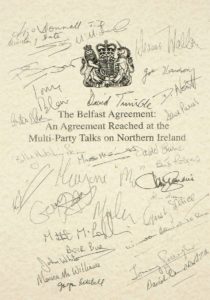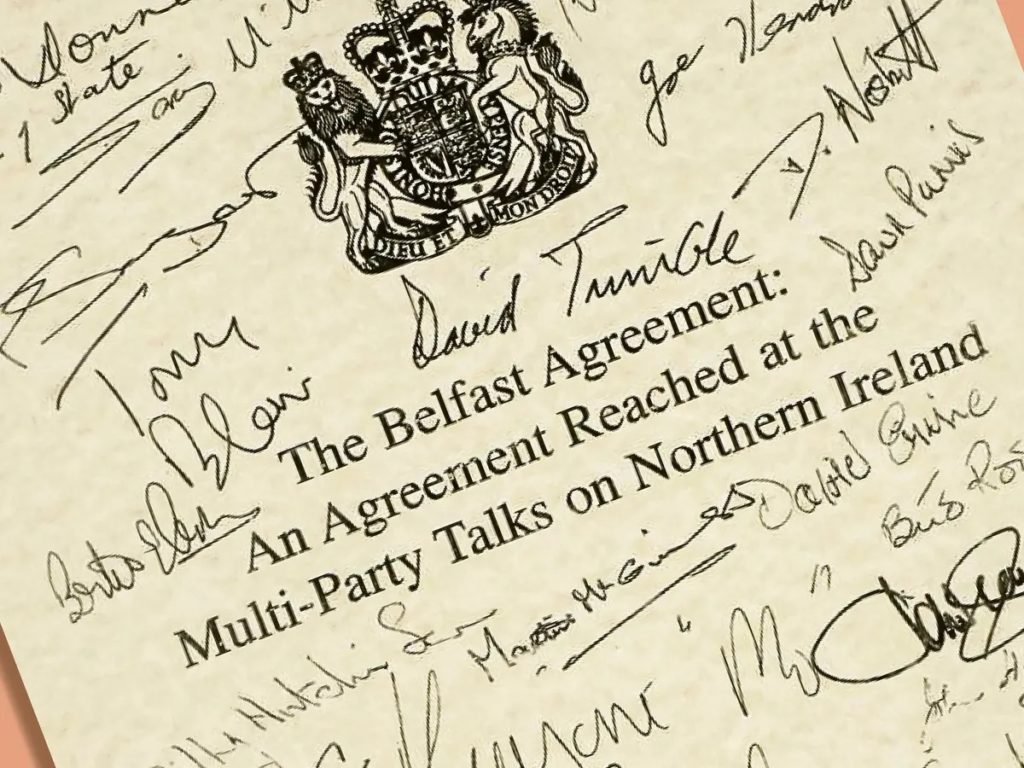Irish America’s publisher Niall O’Dowd wrote the following column on the occasion of the signing of the Good Friday Agreement on April 5, 1998.
Every once in a lifetime or so comes an opportunity to reflect on truly historic news which affects all Irish Americans of whatever class or creed. The peace agreement signed in Northern Ireland on Good Friday after much burning of the midnight oil by all the parties concerned qualifies for the term “historic” and has been portrayed as much by the world media.
There are many naysayers about the agreement but it has undoubtedly created a new opportunity for a different political dynamic to begin in the North. After thirty years of near non-stop violence, it is the best that can be achieved at this time.
Certainly, with its new human rights guarantees, promises on reform of policing, the release of prisoners, and new North/South government bodies which give the Irish government a say in the affairs of Northern Ireland, it is a step in the right direction for nationalists.
It ends forever the Unionist majoritarian role which made Northern Ireland such an ungovernable place because they simply point-blank refused to ever share power. It allows nationalists their own veto, through the new Assembly in which decisions can only be made on a cross-community basis.
Underlying the agreement are the continuing demographic changes in the North that I first wrote about in this column almost ten years ago. Nationalists grew from 33 percent of the population in 1971 to 41 percent in the 1991 census. Now their numbers are thought to be around 45 percent, and it is likely there will be a nationalist majority sometime early in the next century.
The new agreement takes into account such an eventuality, allowing for a poll to be held at some point in the future on whether the people of Northern Ireland want a united Ireland or to stay part of the United Kingdom.

The Good Friday deal has certainly made an impact. Browsing the Internet and reading editorials about the agreement, I was struck by the extraordinary worldwide interest and indeed, the lessons other countries were learning from the Irish experience.
The Times of India editorialized that the new deal might help the two countries involved in Britain’s other 20th-century partition, India and Pakistan, reach an agreement on their problems, while the Jerusalem Post ran several articles comparing the Middle East situation to Northern Ireland and asking if lessons were to be learned.
All international commentators agreed that the new deal is undoubtedly the best opportunity yet to stop the violence and to allow political dialogue to flower in a land that has seen its share of horrific death and injury to all sides.
The Economist magazine quoted a 40-year-old former IRA operative as stating that in his life so far he had “been to 100 funerals” of former comrades killed in the violence and that he was now willing to give the political leaders a chance.
I heard many such sentiments during a recent visit to Belfast — a pride among Republicans that they fought the British Army to a standstill, that neither side could win a military victory, and that there would be no more derisive taunts of “croppie lie down” for this or future generations of Northern nationalists.
But there was also realism in the hearts and in the voices, the knowledge that the political leadership of Gerry Adams and Martin McGuinness had in recent times brought Sinn Féin to a new plane, one which has now made them the third-largest party in Northern Ireland and also holds a seat in the Irish parliament, or Dáil for the first time in a generation.
There is also justifiable pride in the extraordinary international connections they have made, the role of President Clinton in bringing Sinn Féin in from international isolation back in 1994 when he granted Adams a visa, and widespread praise too for the role of former Senate majority leader George Mitchell who surely deserves the Nobel Prize for his efforts. An Irish American winning a Nobel Prize for peace in Ireland would certainly be the ideal final flourish on what has truly been a historic process.♦


Leave a Reply